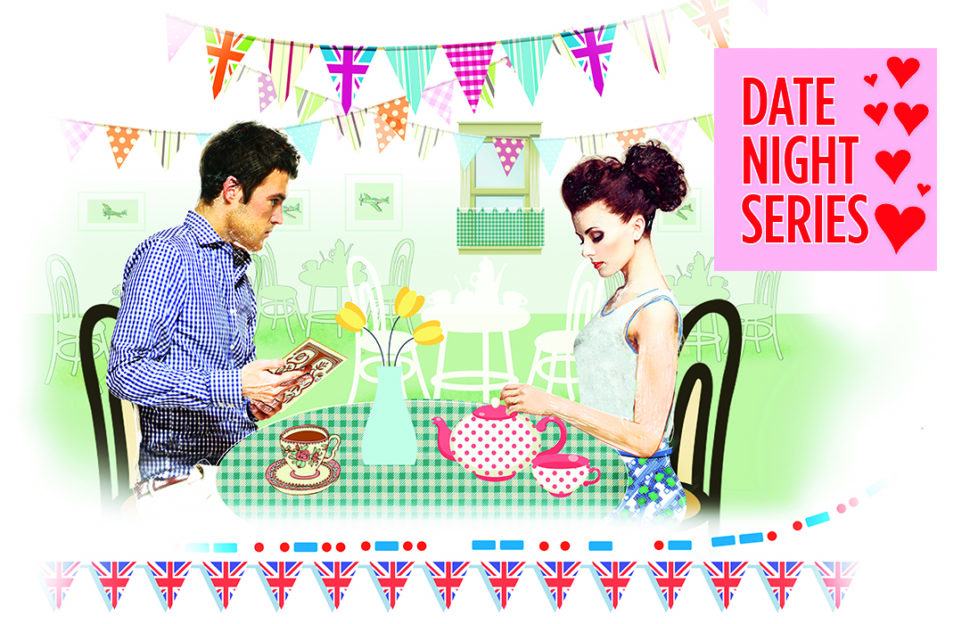We Can’t Be Friends

WRITTEN BY ROSIE EDSER
Their new “relationship” was impossible. How could she pretend not to love him?
Jenny realised she was staring at Mike, if only at his back as he stood at the counter. She soaked up every detail; his broad shoulders, lean hips, glossy brown hair. Today might be the last time she’d see him – if she told him exactly what was on her mind.
She watched as he filled out the forms and paid for tickets. This was a first, she thought – security clearance to go into a museum? Well, to be fair, it was housed inside an operational army base. She heard the man at the desk explain, “It’s OK, sir, we only need one address,” as he handed Mike the tickets.
What a relief. She couldn’t stand to fill out her new address one more time. It had been unbearable over the last few weeks. Explanations to shocked family and disappointed friends. She didn’t want to fill out admittance forms and drift, out of reflex action, into the usual explanation.
“I thought we were going to have to sign the official secrets act back there,” Mike joked.
You could comply with that, she thought, recalling his announcement, “We seem to be moving too quickly, Jenny. I’m not sure I’m a settling down kind of guy. I’ve failed before and I don’t want to fail again with you.”
That had been news to her – the moving too quick part that was, not his divorce. She’d known they were in a difficult place, a stalemate even, but she certainly hadn’t been ready to take a backward step in their relationship. She didn’t want to lose him, otherwise, she would never have agreed to these non-dates where they chatted about superficial trivia. So in a rash of temper she moved her things out of his flat – but she still loved him. Loved him far too much to give up on her emotions.
Mike looked towards the gift shop and the entrance beyond. “Let’s see what it’s all about, then,” he said.
She waved their leaflet at him. “The Royal Signals Museum? Here to tell the story of military communications? Exactly what it says on the tin, I believe.”
“Just making conversation,” he said, with a look of irritation.
It was all she could do to keep their lines of communication open. Jenny only hoped her efforts would pay off. She’d begun to find these days a real challenge and the two of them being “just good friends” was sweet torture.
Ironically she couldn’t talk to him about anything much now. They were stuck in a deception that rendered them next to silent. They could discuss the present, but never the past. The future was pretty much out of bounds as well. Friends didn’t analyse their old relationship, friends avoided saying, “Do you remember when…?” Friends said, “Take care,” but never, “I love you.”
Mike ushered them towards the exhibits. The touch of his hand on her arm sent her confusion souring again.
“I love this Heliograph,” Mike said. “It uses sunlight to signal messages.”
“That would appeal to your energy-saving green ethos.”
“Are you digging at me for turning the heating off at nine o’clock?”
“No, of course not.” Jenny had locked such remarks in the box marked Classified. These were words that belonged to lovers who shared the same address, not to refugees from a relationship who were now just friends.
“Hey, Jen. There’s a display about dog messengers.”
Is that why he brought me here?
He must have remembered my interest in animals who won the Dickin Medal, she realised. Was he trying to send out clues? Like the dots and dashes of Morse code, she wasn’t fluent enough to interpret his message of peace, if that’s what he meant. Who could ever tell what he meant?
“They also used homing pigeons.” Mike pointed to a model. “Incredible they could find their way over miles of enemy territory.”
“Incredible,” Jenny echoed.
All these means of communication that people had devised made her want to scream, So why don’t you talk to me?
It was ridiculous. They had phones in their pockets, she’d been ready to listen, hadn’t she? The truth of it was, she and Mike had allowed their relationship to fizzle out like a bomb with a dud fuse.
“War turns life upside down…” he remarked randomly.
“Yes, it puts our own problems into perspective.” She finished the predictable sentence for him. Though, if the country was at war, they’d all be in the same boat, but she felt so different – a lone woman in a world full of couples, like she’d crash landed into unknown territory.
Jenny turned along the corridor, avoiding the succession of families who gathered together as allies. She bent to read the information plates so Mike couldn’t see her face.
Mike touched her shoulder gently
“There’s a truck there with a driving simulator.”
She felt his hand through her shirt. Wanted to turn and slip into his arms. Wanted to test him. See if he felt the same familiar longing that she did. She moved to a safer zone.
“Are you going to criticise my driving?”
“No. Your driving is just fine. It’ll be even better in a static vehicle.”
In the old days she would have playfully thumped him, but touching through the bars of friendship was strictly forbidden though.
“Very funny,” she said, moving towards the vehicle.
Sitting so close, side by side, would be a bad idea, Jenny realised, as they got to the truck. “Mike, you have a go while I find the ladies.”
He shrugged and reached into his pocket. “Here, you’ll need your ticket.”
“Thanks. Don’t go too far off the road.”
“I won’t.”
In the ladies, Jenny wondered if they’d ever talked to each other without riddles. She looked in the mirror, running her fingers through her hair. Sleepless nights had deepened the circles under her eyes. Crying didn’t help either. The edges of her eyelids looked puffy and no amount of mascara improved them.
When she got back to the museum, Mike had finished with the truck and was helping a small boy up for his turn. His mother thanked him and Mike wore that cheery grin that Jenny recalled had once attracted her.
“Shall we go for a coffee?” she suggested, as his expression turned back to neutral.
He waved goodbye to the boy. “How about we get a drink and come back to the Railway Man display. I read something about that in the paper.”
The café was styled as a canteen, Jenny noted, all vintage chairs and Vera Lynn on the radio.
She sat at a window table while Mike went to order. He wouldn’t need to ask her which drink to get – after two years he should know.
“Would you like a slice of cake?” he called over. “Though they mostly seem to be made with carrots!”
Jenny shook her head. He’d conjured up memories of him feeding her fruit cake in bite sized pieces that time she’d broken her wrist.
Vera Lynn started We’ll Meet Again and Jenny wondered if she could stand the charade for much longer.
“What’s wrong?” Mike asked when he returned to their table, putting the laden tray down.
She scrabbled for the right response in this role as comrade.
“I was just thinking what a good job they’ve done here… too good. It makes me sad. Makes me think of soldiers and sweethearts meeting for the last time.”
“Yes, it’s like being in a time slip.”
“It was a hundred years ago that World War One started,” Jenny said.
He nodded. “The war to end all wars, they called it. Then World War Two started twenty odd years later. Someone failed as peacekeeper.”
He ladled two spoons of sugar into his coffee with no apparent care for rationing. “Of course, I suppose things are easier now – for the service families, I mean.”
“Really? How so?”
“Well, they have Skype, emails…”
“What would you and I say to each other if you were leaving for war?” She blurted out the words, frustrated by another surface skimming debate.
Mike swallowed hard, then side-stepped the subject
“My grandad did that. He lost a leg. Rob and I used to be fascinated by his false limb. We were always begging him to take it off, though he’d just laugh at us. I never really thought about how it was for him and my grandma.”
“If you avoid my question again…” Jenny threatened.
“I’ll come back to it. Let me give it some thought.”
Frustrated, she tried another approach, one final attack. “So were they married before he left?”
“No,” he replied. “She waited for him for five years until he came home.”
“Then they tied the knot and had children?” she asked.
“Yes. My dad was the first of seven.”
“What would your grandparents have said to each other in this café at their last meeting?” Jenny pressed.
Mike reached over and took her hand in his, sending a tingling sensation through her skin.
“If you meet someone who makes you happy, you mustn’t wait for me.” He faltered at the end of his sentence, and took his hand back.
Jenny nodded.
He paused, and the moment seemed to stretch into history before he spoke again. “Can I have a photograph to take with me?”
“Mike, I can’t be just your friend any longer.” The words spilled out before she had censored them.
“I know.”
“So why do you keep taking me to tourist attractions?”
He slipped into a terribly British accent. “Let’s just say I’ve been a damn fool, Jenny. A first class idiot.”
She laughed at his BBC radio voice, in spite of her churning emotions.
“Oh no, you need to say more, Mr Harrison. Much, much more.”
He took a sip of his coffee. “Such a rotten female thing – all this talking, forever analysing…”
She couldn’t let him back into her life without change, though…
“Did the art of communication get phased out like ration coupons? Can you ever actually talk honestly to me? Either we are in a relationship or we are not. I won’t do this friends thing any more.”
“You’re right, of course, and I really do know I’m an idiot. It took some time apart for me to see how much you mean to me… I love you, Jenny. Never stopped, old girl. If I was leaving you to go to war, I’d be terrified – petrified even – that I’d never see you again.”
She sobbed – just once – before she buried her feelings back in that Classified box.
Mike handed her a serviette. “Chin up, stiff upper lip, old thing.”
She giggled through the tears that wouldn’t stop now, aware that the lady at the counter was staring.
He drew his chair closer, hiding her face from view. “It’s good we don’t have to wait five years with only letters. I’ve found it tough from one end of the week to the other.”
“You have?”
“Yes. Agonisingly slow passage of time… days of tedium… evenings of bone aching loneliness. I’ve missed you so much. Do you feel better now?”
“I do, now you come to mention it.”
“You know I can’t talk much about this kind of stuff. Maybe I can use my war hero persona to speak for me? He’s certainly done a spiffing job over the last few minutes.”
“Why do you have to be excused communication? Everyone else has to do it.”
“It’s me. I’m a dinosaur, Jen. Time forgot me and I’m left stranded here as an emotional mute. Could we make it work with Captain Comms on side?”
“Anything’s possible if we want it badly enough.”
Mike’s eyes held the kind of honesty she’d remembered from their first weeks together. “Let’s just assume we do want it,” he said. “Very much. Can we take it from here?”
Jenny nodded, and he kissed her.
The woman at the counter seemed relieved and suddenly, as far as Jenny could tell, Vera Lynn sang the most glorious music of all time.
As they left to go back to the museum, back to finish what they’d started, somewhere, possibly from one of the vintage radios, Jenny heard Winston Churchill’s words…
“…this is not even the beginning of the end, but it is, perhaps, the end of the beginning…”
Also in the series:
-
The Dating Game
-
In These Heels
-
All Aboard The Sunshine Bus
-
Avoiding Daniel
-
Change of Heart
-
Friends With Benefits




